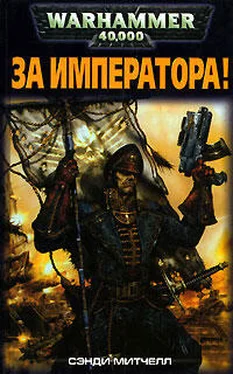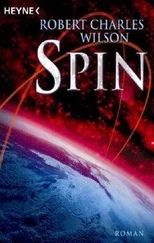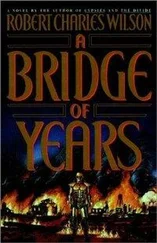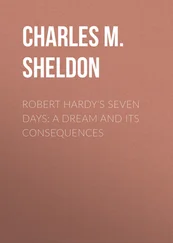Nor did we have any clinical means of monitoring her blood gases, but her lips looked relatively normal when I took the mask away. Her breathing was rapid and shallow, however, and though she opened her eyes once she remained lethargic and unresponsive.
Carol watched suspiciously as I opened the dusty case and extracted one of the Martian vials and a hypodermic syringe. "What's that?"
"Probably the only thing that can save her life."
"Is it? Are you sure of that, Tyler?"
I nodded.
"No," she said, "I mean, are you really sure? Because that's what you gave Jason, isn't it? When he had AMS."
There was no point in denying it. "Yes," I said.
"I may not have practiced medicine for thirty years, but I'm not ignorant. I did a little research on AMS after the last time you were here. I looked up the journal abstracts. And the interesting thing is, there isn't a cure for it. There is no magic drug. And if there were it would hardly be cross-specific for CVWS. So what I'm assuming, Tyler, is that you're about to administer a pharmaceutical agent probably connected with that wrinkled man who died in Florida."
"I won't argue, Carol. You've obviously drawn your own conclusions."
"I don't want you to argue; I want you to reassure me. I want you to tell me this drug won't do to Diane what it seems to have done to Jason."
"It won't," I said, but I think Carol knew I was editing out the caveat, the unspoken to the best of my knowledge.
She studied my face. "You still care for her."
"Yes."
"It never fails to astonish me," Carol said. "The tenacity of love."
I put the needle into Diane's vein.
* * * * *
By midday the house was not merely hot but so humid I expected moss to be hanging from the ceilings. I sat with Diane to make sure there were no immediate ill effects from the injection. At one point there was a protracted knocking at the front door of the house. Thieves, I thought, looters, but by the time I got to the foyer Carol had answered and was thanking a portly man, who nodded and turned to leave. "That was Emil Hardy," Carol said as she pulled the door closed. "Do you remember the Hardys? They own the little colonial house on Bantam Hill Road. Emil printed up a newspaper."
"A newspaper?"
She held up two stapled sheets of letter-sized paper. "Emil has an electrical generator in his garage. He listens to the radio at night and takes notes, then he prints a summary and delivers it to local houses. This is his second issue. He's a nice man and well meaning. But I don't see any point in reading such things."
"May I look at it?"
"If you like."
I took it upstairs with me.
Emil was a creditable amateur reporter. The stories mainly concerned crises in D.C. and Virginia—a list of official no-go zones and fire-related evacuations, attempts to restore local services. I skimmed through these. It was a couple of items lower down that caught my attention.
The first was a report that solar radiation recently measured at ground level was heightened but not nearly as intense as predicted. "Government scientists," it said, "are perplexed but cautiously optimistic about chances for long-term human survival." No source was credited, so this could have been some commentator's fabrication or an attempt to forestall further panic, but it jibed with my experience to date: the new sunlight was strange but not immediately deadly.
No word on how it might be affecting crop yields, weather, or the ecology in general. Neither the pestilential heat nor this torrential rain felt especially normal.
Below that was an item headlined lights in sky sighted WORLDWIDE.
These were the same C- or O-shaped lines Simon had pointed out back in Arizona. They had been seen as far north as Anchorage and as far south as Mexico City. Reports from Europe and Asia were fragmentary and primarily concerned with the immediate crisis, but a few similar stories had slipped through. ("Note," Emil Hardy's copy said, "cable news networks only intermittently available but showing recent video from India of similar phenomenon on larger scale." Whatever that meant.)
* * * * *
Diane woke for a few moments while I was with her.
"Tyler," she said.
I took her hand. It was dry and unnaturally warm.
"I'm sorry," she said.
"You have nothing to be sorry about."
"I'm sorry you have to see me like this."
"You're getting better. It might take a while, but you'll be all right."
Her voice was soft as the sound of a falling leaf. She looked around the room, recognizing it. Her eyes widened. "Here I am!"
"Here you are."
"Say my name again."
"Diane," I said. "Diane. Diane."
* * * * *
Diane was gravely ill, but it was Jason who was dying. He told me as much when I went to see him.
He hadn't eaten today, Carol had informed me. Jase had taken ice water through a straw but otherwise refused liquids. He could barely move his body. When I asked him to raise his arm he did so, but with such exquisite effort and torpid speed that I pressed it down again. Only his voice was still strong, and he anticipated losing even that: "If tonight is anything like last night I'll be incoherent until dawn. Tomorrow, who knows? I want to talk while I still can."
"Is there some reason your condition deteriorates at night?"
"A simple one, I think. We'll get to that. First I want you to do something for me. My suitcase was on the dresser: is it still there?"
"Still there."
"Open it. I packed an audio recorder. Find it for me."
I found a brushed-silver rectangle the size of a deck of playing cards, next to a stack of manila envelopes addressed to names I didn't recognize. "This it?" I said, then cursed myself: of course he couldn't see.
"If the label says Sony, that's it. There ought to be a package of blank memory underneath."
"Yup, got it."
"So we'll have a talk. Until it gets dark, and maybe a little after. And I want you to keep the recorder running. No matter what happens. Change the memory when you have to, or the battery if the power gets low. Do that for me, all right?"
"As long as Diane doesn't need urgent attention. When do you want to start?"
His turned his head. The diamond-specked pupils of his eyes glittered in the strange light.
"Now would not be too soon," he said.
ARS MORIENDI
The Martians, Jason said, were not the simple, peaceful, pastoral people Wun had led (or allowed) us to believe they were.
It was true that they weren't especially warlike—the Five Republics had settled their political differences almost a millennium ago—and they were "pastoral" in the sense that they devoted most of their resources to agriculture. But nor were they "simple" in any sense of the word. They were, as Jase had pointed out, past masters of the art of synthetic biology. Their civilization had been founded on it. We had built them a habitable planet with biotech tools, and there had never been a Martian generation that didn't understand the function and potential uses of DNA.
If their large-scale technology was sometimes crude— Wun's spacecraft, for instance, had been almost primitive, a Newtonian cannonball—it was because of their radically constrained natural resources. Mars was a world without oil or coal, supporting a fragile water- and nitrogen-starved ecosystem. A profligate, lush industrial base like the Earth's could never have existed on Wun's planet. On Mars, most human effort was devoted to producing sufficient food for a strictly controlled population. Biotechnology served this purpose admirably. Smoke-stack industries did not.
"Wun told you this?" I asked, as rain fell continuously and the afternoon ebbed.
"He confided in me, yes, though most of what he said was already implicit in the archives."
Читать дальше












